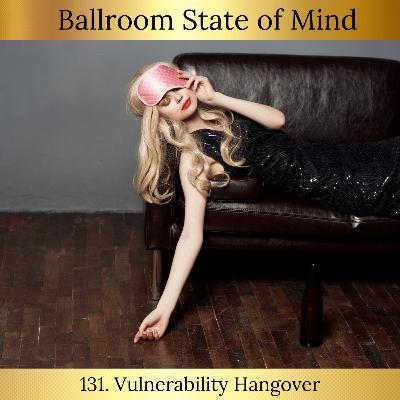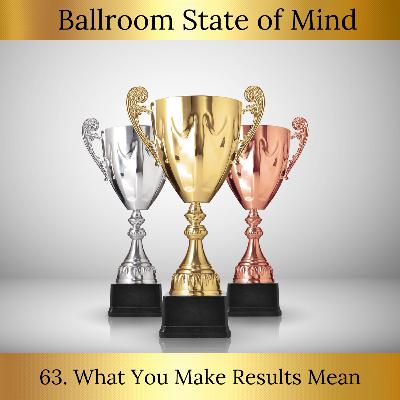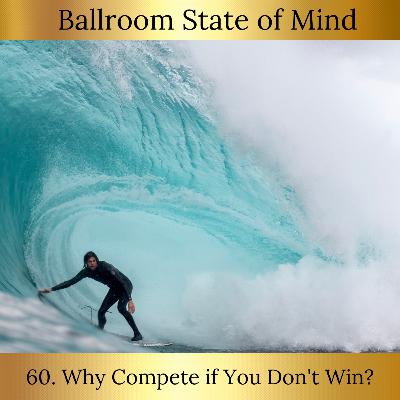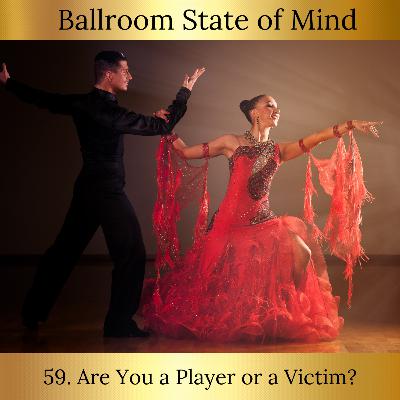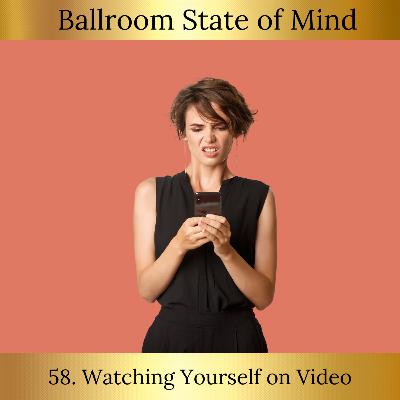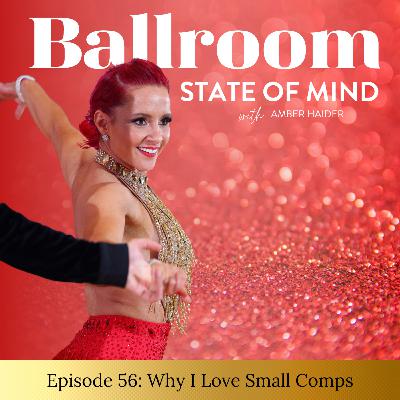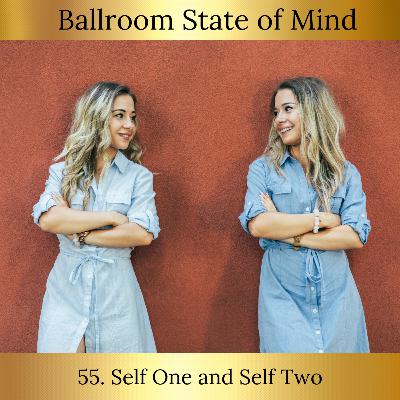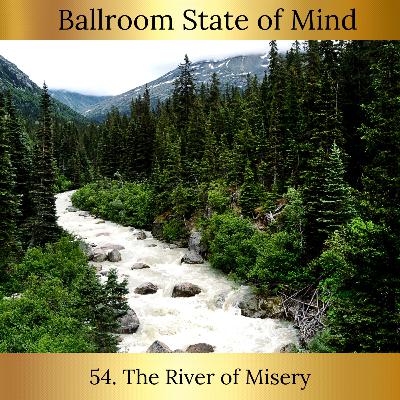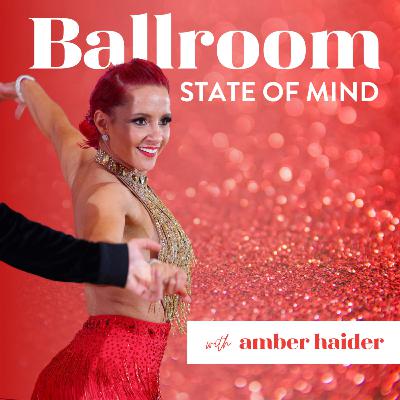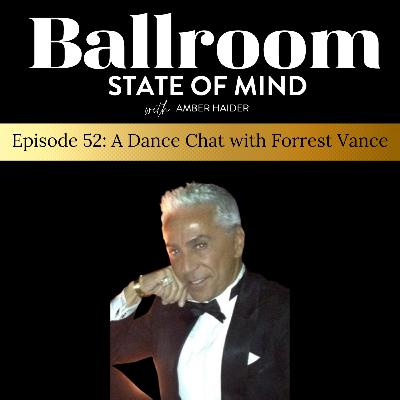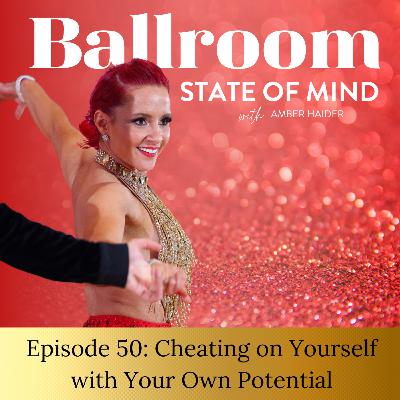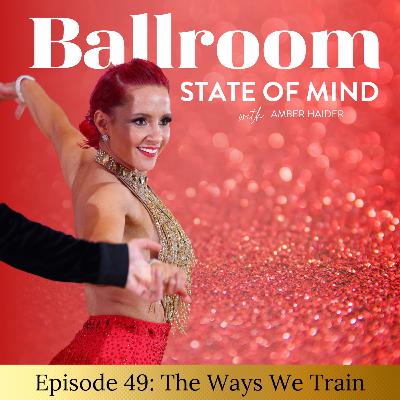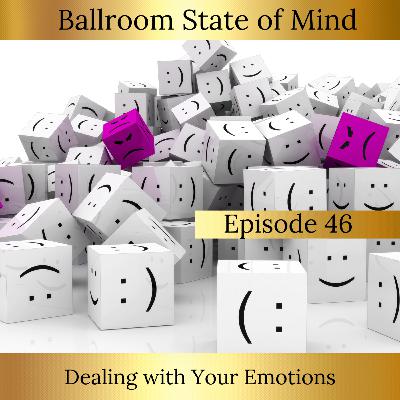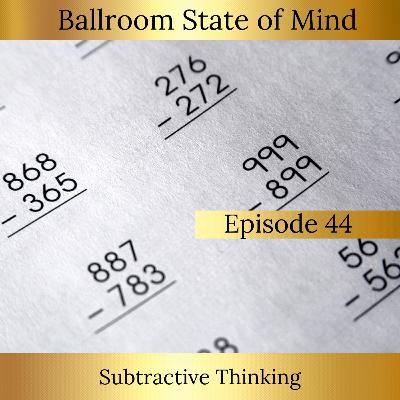Discover Ballroom State of Mind
Ballroom State of Mind

Ballroom State of Mind
Author: Amber Haider
Subscribed: 9Played: 338Subscribe
Share
© Amber Haider
Description
Ballroom dancers love working on their dancing skills and technique! But if dancers neglect to train their mind, it can sabotage them when it counts most.
I'm Amber Haider and I'm a Life and Mental Strength Coach for amateur ballroom dancers. If you want to take your dancing further, faster, with less anxiety and more fun, stick around. It's time to make that beautiful brain your most powerful asset. We talk about dance AND life, providing tools to uplevel all areas of your life, not just your dancing!
Visit www.amberhaider.com for more information and for contact details
I'm Amber Haider and I'm a Life and Mental Strength Coach for amateur ballroom dancers. If you want to take your dancing further, faster, with less anxiety and more fun, stick around. It's time to make that beautiful brain your most powerful asset. We talk about dance AND life, providing tools to uplevel all areas of your life, not just your dancing!
Visit www.amberhaider.com for more information and for contact details
140 Episodes
Reverse
Have you ever felt raw, exposed, or even regretful after a competition, showcase, or intense lesson—no matter how well it went? That’s what Brené Brown calls a vulnerability hangover. In this episode, I unpack what it means, how it shows up for dancers, and why it’s actually a sign of courage, not weakness. You’ll hear real examples from lessons, coaching, and competitions, plus practical ways to process those tender feelings with compassion. Vulnerability isn’t something to “fix”—it’s proof that you’re brave enough to keep growing.New clients who want into the Ballroom State of Mind Coaching Program can go HERE to purchase the entry package. After the initial 3 months, you can stay in the group for a low monthly rate! See you inside!
Dancers can really struggle with results. I certainly know dancers who have told me they quit because they simply couldn't mentally handle poor results. There are a couple of reasons that I have encountered that I think make us uncomfortable with our results.
1. You think results are objective, or at least they should be. In your mind you keep trying to make sense of it and make it concrete.
Your results are subjective. They just are. If for no other reason, they are Stop wanting them to be objective. Here are just some of the ways your results are subjective:
Who is in the round with you? How are you or them dancing that comp, that day, that round? Who is on the judging panel? Did the panel change? What are the preferences of those judges? When did they see you? Did they see you in a good moment or a mistake? Did they see you at all?
2. You try to find deeper meaning in the results. You tie your worth to the results. If it goes well, you are good. If it goes poorly, you are not good. So the results are going to determine how you feel about yourself. That means there is a lot on the line.
Your value and worthiness as a human being is not dependent on your achievements. Your worth is set. It is not conditional on anything. It just is. Your achievements are just how you get to grow and expand and challenge yourself. They aren't what determines your value. Period. You don't have to earn it.
When it comes to your results...here are some ways you can use them for your good instead of using them against yourself.
Look for patterns. What is generally happening now in your placements, and are you moving into slightly higher placements more of the time? Are you making more finals? Are you getting a few more better marks? Are your marks somewhat consistent across the judging panel? What data can you extract and put to good use?
How is your competing going? Is your partnering getting better? Are you feeling better, more in control, and having more fun? Are you able to tell which of your dances are stronger?
Use your marks constructively. Don't beat yourself up with them. Don't look for deeper meaning. Extract some data and get back to work. Elizabeth Gilbert said, "Measure your worth by your dedication to your path, not by your successes and failures." Whether you succeed or fail, you will wake up the next day and go at it again. So focus on your craft and the results will take care of themselves.
Join Joyful Ballroom HERE
Book a Dance Strategy Call HERE
Being physically injured is hard enough without also having all the emotional fallout. In this episode we give voice to some of what we might experience emotionally with a dance injury, but then we also talk about coping strategies to help you get through it.
Here are the 6 points that you can consider to help you in your recovery from a dance injury.
1. Acceptance. Accept that you are injured and that you have to slow down. Resistance to what is will slow your recovery. Stress, tension, impatience are all understandable but detrimental to your ability to recover. Accept what is and move forward.
2. Partner WITH your body. Don’t go to war with yourself. Be careful how you treat yourself. Don’t be mad at your body or believe it is against you in some way. Take care of it. Do the self care. Do the active recovery like it’s your training plan. Rest, do Physical Therapy if you have it. The body heals when it heals so do everything you can do help it along. This includes loving it. Don’t overdo it. Speaking preventatively, don’t push through pain. The instant I feel like I tweaked something, I sub out my fitness classes and rest. I don’t mess around anymore. Don’t be a hero and try to push through pain. Preserve your health by being proactive when things are off.
3. Sometimes you have to go slow to go fast. When I had shoulder issues, I tried to come back prematurely a time or two but kept getting sidelined. Finally, I gave up my classes, scaled back and settled in for the long haul. It took 18 months, including nearly a full year of PT to get my shoulders back to a good place. Remember recovery is hard work. It can seem like you aren’t doing anything, but your body is hard at work. Healing is a hard job. You will feel lazy and tired at times not doing much, but your body is working all along.
4. Do what you can. With dancing there are some things you can modify. With my shoulders, we would practice with lower hand positions so I wouldn’t flare up my shoulders. You might only be able to watch videos or performances. You can decrease practice, avoid injured areas, or learn by watching. For some people still being a part of the dance world helps, for others it doesn’t.
5. Do other things. Take this time to pursue other things you care about that allow your body to rest. Be a whole person. What else to do you like? When dance is your only thing, and it becomes your identity, when we have a setback it can feel like we have nothing left. Don’t let that happen to you. No one things can define who we are. Embrace the time off if it comes to that. Find a way to keep your brain busy so it doesn’t ruminate on the injury. Find another outlet. Cross train.
6. Tend to your mindset. Focus on wellness. I realized at one time I was focused on my illness. I was thinking about the pain I was in or that my shoulders or neck “still weren’t better.” At some point I read something that talked about the mind body connection and how powerful it is. So I decided to stop thinking about my illness and focus on wellness. I started talking about how much better things were getting. I would try to celebrate small milestones. I can’t turn my head but at least it doesn’t hurt anymore! I would speak gratitude for what was working well or what I could still do. I would say to myself over and over again in my mind that my body was doing just a good job of healing. I would visualize myself dancing or teaching my classes again with my full abilities. Imagine yourself coming back stronger than before. Tending to your mindset might include talking about it as well. Talk to a therapist or a coach (ahem). Explore relaxation techniques. A mind and body that is at peace heals much better and faster than one in a stress response. Watch that part of your brain that wants to tell a fatalistic, scare story, and don’t let it get carried away.
Nurture peace, wellness and gratitude to speed your healing.
Join Joyful Ballroom HERE
Book a Dance Strategy Call HERE
Some people are really uncomfortable with competition. It seems divisive and creates a hierarchy where someone has to end up feeling bad about themselves.
Some people avoid competition for this reason. Others compete even though they agree with his model, but are stressed and anxious the whole time because their self worth is on the line.
Another group competes but rebels against this model by not trying to their fullest. That way if they lose, it didn't count because they didn't try anyway.
But I wonder if there is a way to compete without the ego trip, but still maintain the intensity and passion of a good competition. There is a way. And once you hear about it, you will jump right on the bandwagon because it makes competing SO MUCH FUN!
Referenced in this podcast: The Inner Game of Tennis by Tim Gallwey
Joyful Ballroom Facebook Group HERE
Book a Dance Strategy Call HERE
In this episode we ask the question, "Are you a player or a victim?"
We talk about what that means, why you might be stuck in victim mode, and some strategies to get yourself out.
Referenced in this podcast:
Ninja Selling by Larry Kendall
Conscious Business by Fred Kaufman
Book a Dance Strategy Call HERE
Join Joyful Ballroom HERE
Watching yourself dance on video can be excruciating! But it's a skill I think you should develop. In this podcast, I offer the reasons I think we hate it so much, why you should do it anyway, and how to approach the process to make it easier on yourself.
Reasons we don't like watching ourselves dance on video:
1. Our negatively biased brain makes is a negative experience
Your brain is great at pointing out what is wrong, where the flaws and imperfections are, and it does it in a disproportionate amount compared to the positive things you might see.
2. Video doesn't match perception
The video simply does not look like it felt. A 2-dimensional representation on a device is nothing like a living, breathing, 3-dimensional real world experience. Plus, you never really see yourself from the outside.
3. You aren't used to it
Going along with the previous point, you aren't used to watching yourself or seeing yourself in this way. And you make efforts to avoid it, so you never let yourself get desensitized to it. You watch your videos with critical or judgemental eyes, get uncomfortable, stop and then avoid in the future.
4. Comparing yourself to more skilled dancers
If you are like me, the videos that you watch on the regular are the ones that come through a social media feed or I find on Youtube. Those dancers are usually pros or dancers who are much further along than me. So I get this idea of how a video should look. Then I see my own videos. OOF! Yikes! If you are comparing yourself to them, you are going to come up short for sure!
While it is an uncomfortable experience for you right now, I want to encourage you to do it anyway. Here are some reasons why:
1. Can't fix what you don't see. Video gives you a concrete picture of what is working and what is not.
2. Increases the rate at which you improve. Because you can see what needs work, you can get to work on it. Turning a blind eye certainly slows down your progress.
3. You can track your progress over time. This can serve as great motivation when you can look back at old videos and see all your improvement.
4. Having videos makes it easier to recall for practicing. See point 2! You don't have to remember what you needed to work on and you have videos that you can reference and learn from.
5. You get more comfortable watching yourself dance. Simply watching yourself dance on video desensitizes you and you settle in. You become more objective and aren't as derailed if you have things you see you want to fix. It also means that you are more comfortable with other people watching you.
6. You learn to have a more realistic and balanced view of yourself and your dancing. You learn to look at the positive things as well as what needs work. You settle down emotionally and are able to get to work on what is next.
So how can you approach it so it is more tolerable?
--Watch with someone who is more objective than you
--Remind yourself that something is just lost in translation when it comes to video
--You are not alone. Most people don't like it. Let that be okay.
--Give yourself some distance. Don't watch the videos immediately after a performance. Let yourself settle down emotionally first.
--Do it more frequently to get used to it.
--Watch your videos several times. First to get your cringing out of the way, second to watch overall, third to look for what is working, and lastly to find 1-2 things to work on in the coming weeks.
--Approach your videos with purpose and intention. Use them as a tool and be prepared to have an action plan when you are done watching.
--Allow equal air time for the positive and negative aspects
--Get neutral. This is math. There are skills and tasks you are developing. Leave your ego out of it.
--A video is one snapshot of a moment in time. You are already different. Don't get stuck on that moment in the past.
This is such good work to do. It's worth it.
Join Joyful Ballroom Facebook Group HERE
Book a Dance Strategy Call HERE
"Why am I so negative all the time?!"
Ever noticed how you are being negative about your negativity? This episode addresses negativity so you can make peace with it, get over it, and move on with an intentional, more forward moving mindset.
The stages you might go through as you work on this are the following:
Stage 1: Unintentional or unconscious negativity--You get swept up in it and it carries you away. You don't even notice it has happened. But you probably feel drained a lot of the time. You are your negativity are ONE.
Stage 2: Aware but judgmental--You see it. You become aware of your negativity, but then you judge yourself for it. You wish you didn't do it. You blame circumstances for it. Notice how you're still negative? Your just aware AND negative.
Stage 3: Non-judgmental Awareness-- You notice it but stop judging it. You might feel curious about it. You are more an observer of it. You stop resisting it but you don't indulge it either. No getting carried away. More neutral feeling.
Stage 4: Intentional Thinking--This is where you decide intentionally how to respond. You get to decide who you want to be, how you want to think, feel and act in the situation. You will still experience negativity, but it won't be driving the car. You will be in control of it more of the time.
Listen in for real world examples of what it looks like to put this into practice.
Join Joyful Ballroom Facebook Group HERE
Book a Dance Strategy Call HERE
A small competition might seem like a waste of time and/or money because you might not have a lot of competitors to compete against. But not so fast! In this episode I want to share just 4 reasons I love small competitions.
While I wouldn't do exclusively small competitions or make that the main gig that I do, there is a lot of value to be had in a small comp and you can totally leverage it and use it as a tool to benefit you.
Reason #1 I love small comps is small and/or uncontested rounds. Uncontested rounds give you the opportunity to let go of the result and experiment. This is a great time to test out some techniques you have been working on, trying to be more expressive, or just letting go, because we don't have to worry as much how it will affect our score or result. See podcast #18 for more about uncontested rounds.
Reason #2 that I love small competitions is that you get more exposure to judges--or rather, they get more exposure to you. They can watch you for a longer period of time (maybe a whole minute rather than a fraction of that) per round, plus more of the day. In a large competition where there are multiple couples and even semi-finals to finals, you are one of many people they have to watch and consider. In a round with just a few competitors, a handful at most, they get a better idea of you as a dancer. If by chance you DON'T want that, we need to talk on a Dance Strategy Call because we might need to bolster your confidence and comfort with being seen!
Reason #3 to love a small comp is that it's great for relationship building. This is partially about exposure, like in point two, but also, there is just more opportunity to talk to people--judges, organizers, other studios, other dancers--simply because there isn't the distraction of SO many people. At a bigger comp, judges may socialize and spend more time with people they know and are excited to see (as they should!), but at a small comp, I find they are more agreeable to chatting, having a small exchange, and/or talking with you or your teacher about your dancing. I literally had a recent multi-year national rhythm champion sitting next to me at my table last weekend talking to me about my dancing. That would not be likely to happen at a big competition. Building a community and building relationships in the dance world deepens your experience of it. These are your people. They love what you love and understand what this world is all about. It's good to have a stronger foothold in it, if you want, to enrich your experience. That might not be true for everyone, but it is for me.
Reason #4 I love small competitions is simply that when you compete, you get better at competing. Full stop. Whether it's small or big, you simply can't replicate a comp in a practice setting. You have to be in that environment. You have to have those experiences. More dancing makes better dancing and more competing makes for better competing. It's that simple. It's never a waste. And at the end of the day, you are always competing with you and the last version of you. Use the comp as a tool for making yourself better, no matter the size. See episode #38 for more on Being the Boss of Your Comp
Join Joyful Ballroom HERE
In the book The Inner Game of Tennis, we learn about the concept of Self One and Self Two. Anyone who has tried to get themselves to do anything can relate to this concept. There is a Self One who instructs and a Self Two who carries out the action. The relationship between these two matters a lot. This is especially because Self Two is actually VERY capable of learning and applying things very quickly so long as Self One doesn't slow it down by micromanaging it. Which Self One really likes to do.
Listen in to find out why this is important and how to improve the relationship with yourself so you can progress MUCH faster.
Find out more about The Inner Game of Tennis HERE (amazon affiliate link)
Book a Dance Strategy Call HERE
Join Joyful Ballroom Facebook group HERE
The River of Misery is what I call that transition place between where you are now and where you want to get to in your life.
Becoming a new version of yourself, or even just a better dancer, requires some hard work. Your brain has to work harder to break old habits and patterns and create new ones. So it tries to stop you and keep you where you are.
The River of Misery feels like work.
And there’s a lot of back-and-forth. There will be good days, and successes, but also times where old habits and patterns reappear. If you don’t know that you are in the River of Misery, you might think you are backsliding or doing it wrong, or not committed. You might beat yourself up for not doing it perfectly 100% of the time. But that’s all part of the process. That’s how it goes. And if you know that, then you can be proud of your successes, and discount your failures. You can forgive yourself sooner and continue to move forward
That River of Misery, that process, is the refiners fire that creates the new you. It’s the reason growth is so satisfying. It’s the reason you feel accomplished and gain confidence. You can’t skip over it. So embrace it. Because when you get there, you’ve earned it.
And that doesn’t feel like misery.
It feels AMAZING! And it’s totally worth it.
Not to worry, I’ve got your back. I know how to handle it because I’m working through it too.
Book a Dance Strategy Call HERE to get help with your River of Misery.
Join Joyful Ballroom HERE
We talked about the darkside of perfectionism in podcast #51 recently, and so now it's time to talk about how to overcome it.
1. Watch yourself. Pay attention to the parts of perfectionism that you like and those you don't. Sift through them so you know what parts can continue to serve you and what parts we want to change. For example, let's keep working hard, wanting to be really good and excellent and also paying attention to details and trying our best. But let's maybe let go of the harsh inner critic, the intolerance for anything less than perfect, and the impossible standards that no one can meet.
2. Quite your inner critic. You can still motivate yourself with your self talk but let's try to change the tone. The task-master that is particularly nasty or harsh isn't necessary to get good work out of you. Does is work? Sure. But it sounds and feels terrible. I think whatever we think criticism does, love does it better. Take the time to change your inner voice and it's tone. If you aren't sure what it should sound like, consider what you would say to someone you love and care about to encourage them. Or think of someone else who does this well and follow their example.
3. Increase your tolerance level for mistakes. Diffuse them. They are not a big deal. There is only so much you can guess and figure out ahead of time. Some holes are only going to be revealed in the moment of truth. This is not a character flaw. Nothing has gone wrong. You need these moments to help us find what we need to still work on. Making the mistakes a big deal backfires. Not beating yourself up in the moment allows you recover faster which will lead to more success.
4. Focus on the process instead of the result. Adopt a growth mindset. Perfectionism is focused on the outcome–the end goal. Give more focus to the process of growth. We are never done, perfect, finished. We just improve. We are always growing so open yourself up and get comfortable with being on a path of progression. A growth mindset acknowledges that we will always have room to grow. This is not a personal failing.
5. Let it be fun. Let it feel good. There will be times you feel defeated, disappointed, sad…that is normal. But most of the time let this be fun. Enjoy it. When the result will determine our worthiness or value, then all of it becomes stress and pressure-filled and high stakes. Don’t take yourself so seriously. Laugh more. Laugh off mistakes. Take more risks, let loose a little. Don’t hold so tight to making it all just so and getting just the right results. Enjoy the ride.
At the end of the podcast, I tell you how to ACTUALLY put this into practice in the moment, so don't cut out early and miss the practical application!
Go HERE to book a Dance Strategy Call
Go HERE to join Joyful Ballroom
My first interview! Yay! I'm thrilled to bring you this chat with Forrest Vance, an icon in the Ballroom Dancesport industry.
Forrest Vance is a highly accomplished dancer, teacher, coach, consultant, choreographer, and adjudicator with a career spanning over four decades. He holds all levels of certification and examinations in American and International styles in multiple dance instruction organizations like FADS, NDCA and more. His extensive experience in the industry has made him a valuable resource for top professionals, prom-am and amateur couples.
Forrest's impressive dance career includes numerous championships in American Rhythm and Latin categories, including five-time undefeated USA American Rhythm Champion, Fred Astaire seven-time American Rhythm Champion and 2 time international Latin Champion. 4 time Canadian American Rhythm Champion, and many others. He has also been recognized with several awards, including the 2010 Hanlon Ford Award and the 2012 Professional Hall of Fame Award.
Apart from his dance career, Forrest is the successful producer of "Not Strictly Ballroom" instructional dance videos in Ballroom, Latin, and Country Dancing, and organizes and hosts The People's Choice Dancesport Competition in Scottsdale, Arizona.
In this episode, we talk about his history in the industry, what he likes most about it, and the importance of staying positive in your dance journey.
People's Choice Dancesport Competition
To learn more about Forrest Vance, check out his WEBSITE
Go HERE to book a Dance Strategy Call
Go HERE to join Joyful Ballroom
Perfectionism seems so useful. It seems good. It's all about excellence and being the best we can be at something, right? Kind of. There are good parts of perfectionism--the hard work, attention to detail, concientiousness, and high motivation. When perfectionists do accomplish things, it is pretty impressive, right?
But the parts of perfectionism that are NOT good are the ones that differentiate perfectionism from simply healthy striving. In this episode I give seven hallmarks of perfectionism. It's not an exhaustive list, but some of the things I see a lot in my perfectionist ballroom dance clients.
1. Procrastination-While it seems like perfectionists are high performers and that they would get a lot done, often the opposite is true. Needing the product to be exact and perfect leads to procrastination because it's never quite up to our standards. That, or we get overwhelmed by what needs to be done to make it perfect and we delay or don't do it in order to feel relief from the pressure and overwhelm.
2. When is enough, enough? Perfectionists don't know when to stop. We can always improve things and make it better, but when does that end? Others may see what we have done as awesome and great, but we can still see it as flawed and not good enough. We don't have a realistic sense of what "good" is. Constantly trying to make it better can lead to overworking and exhaustion...aka burnout.
3. Burnout is common in perfectionists. We do a lot of work and then possibly don't put it out into the world. Or when we finally do, it has gone through so many drafts that we are just plain exhausted. Also, perfectionists are slim on praise for themselves. They don't offer the congratulatory pat on the back for a job well done very often. It's really hard to keep up the good work when the rewards are few and far between. So we kind of have to quit for a while, recharge, and then try again. This happens much less often when someone can feel good about their work and move on quickly from setbacks.
4. Low self-esteem is a hallmark of perfectionism that is sometimes hard to spot. But all perfectionism stems from a need to prove oneself as worthy, either to oneself or to others. But when the voice in your head is mostly critical and unyielding, it makes sense that you wouldn't feel very good about yourself and persistently see yourself as less.
5. Perfectionism can lead to an emotional roller coaster. Lots of stress, pressure and anxiety up front and depression on the back end. When this keeps up chronically, it can lead to mental, emotional and physical ailments as well.
6. Hindered creativity and innovation–Just ask a dancer who is trying to dance perfectly and also be creative and expressive and you will see why perfectionism gets in the way. Fearing failure means we are less wiling to take risks, less willing to try new things.
7. Strained relationships. Perfectionists hold themselves to high standards and often those around them. In dancing this can be especially apparent in partnerships. The perfectionist may view the other person as lazy or like they don’t care as much. This lead to frustration, resentment (on both parts) poor communication and problem solving, and more conflict when a perfectionist is unyielding.
The good news is that high performance can exist without the dark side of perfectionism. You get to keep the healthy striving, high motivation, attention to detail and lots of success--without the fog of negativity and criticism.
Perfectionism feels noble but it's a pair of handcuffs preventing you from becoming all that you could be. It's not making you perfect. It's making you small and scared. Let it go and see what happens.
Book a Dance Strategy Call HERE
Join Joyful Ballroom HERE
Saying you have so much potential seems like such a nice thing to say. But have you noticed how it can also mean that you aren't good enough now? That if you could just be better then we could be satisfied?
Dancers spend way too much time focusing on what they lack. They look to the future and what could be and then feel bad about where they are now. This is a huge disservice that you are doing to yourself because it puts you in such a weak position. It puts you in a one-down position and one of deficiency. Not a very powerful or confident place to operate from.
You will always have growth you want to accomplish. There will always be things you are striving toward. But that doesn't mean where you are now is lacking or deficient. In fact, if you were to look back and see where you have come from, you would see just how "enough" you are. You would see all that you have gained and all that you have to offer now in this moment already. This is the whole premise of the the book The Gap and the Gain by Dan Sullivan and Benjamin Hardy.
When you focus on the gap between where you are now and were you could be, you may feel more frustrated, insecure, resentful and hopeless. Giving attention to the gain helps you see just how valuable and skilled you are now, which is great emotional fuel to launch forward with.
Listen in to hear how this applies to a dance partner search, competition mindset and other areas in your life where you are seeing yourself as less when you could see that if you just owned and embraced who you are how you could start taking the world by storm.
The Gap and the Gain, Dan Sullivan and Benjamin Hardy
Join Joyful Ballroom Facebook Group HERE
Book a FREE Dance Strategy Call HERE
When dancers are thinking about how to train, I think it's pretty obvious what the standard methods are. Take lessons, practice on your own, participate in outside coaching, do some group lessons, workshops, social dancing, and perform or compete regularly. Not a mystery.
What I want to talk about today are ways you can train that you might not have thought of. These are ways that you can use your regular life experiences to help change you as a person from the inside out. They can make you stronger, more resilient, and give you an edge over the dancers around you.
1) Get in great shape--there are lots of ways to do this. Listen in for the ways in which I think apply to dancing specifically.
2) Get under pressure--find ways in which you can be put under pressure and have eyes on you while you do it. It might surprise you to hear that I don't want you to do this and succeed all the time. One key to this is to have eyes on you while you mess up and make mistakes. Why would you want to do that?! Listen in to find out.
3) Be bad, a lot--in connection with point #2, finding ways to be bad and make lots of errors will make your progress exponentially faster. You won't be bad all the time. In fact, you will be fantastic a lot of the time. But fear of making mistakes is holding you back. To overcome it, you have to normalize it. I teach you how.
4) Do your inner work--you must learn to disconnect your value from your results. Not just in dancing, but in life. Your value has nothing to do with your job, how productive you are, your accomplishments, how your family and friends view you...none of it. You can sit on the couch eating donuts and you are not less valuable. Do the work of knowing your worth and your value so that you don't have to use dancing to prove it. You have nothing to prove. Listen in to hear how this work affects your dancing in positive ways.
There are many areas of your life that you can use to give you huge gains in your dancing that seem to have nothing to do with dancing at all. Perhaps you have more ideas and experiences you could share? Share them in our Joyful Ballroom Facebook Group HERE.
Book a Dance Strategy Call HERE
In this episode, I introduce the tool known as the Alter Ego. This concept came from the book The Alter Ego Effect by Todd Herman.
This is a useful tool if you have limiting beliefs about what is possible for you, if you have a story about yourself that you just can't shake, or if you have tried and tried to show up differently at competitions but you just can't seem to do it.
Many high performers, famous people, etc, have used an alter ego to help them reach new levels by tapping into parts of themselves and creating a version of themselves that is far more effective at doing what is required in a high pressure moment like a ballroom dance competition. Listen in to learn about this tool and how to apply it.
Far more details are provided in the book, which I highly recommend you read!
Book a free Dance Strategy Call HERE
Everyone wants more confidence.
What is confidence anyway? Everyone likely has their own definition of what that looks like and what it means.
I recommend that if you want more confidence, you get more specific about what you mean by that. Get a good idea in your head so that you know who it is you are trying to be. What is that confident version of you thinking, feeling and doing?
But maybe more importantly, why are they able to show up that way?
I see confidence as two different types. There is the confidence that comes from experience and repeated successful attempts at something. And then there is self-confidence which we can have even if we have no evidence that we will succeed. I think that self-confidence is what everyone is really seeking. Listen in to hear a break down of how these are different plus where arrogance fits in to this discussion.
Book a dance strategy call HERE
Sometimes when you have been working on your mindset, you can find yourself in a time when it doesn't seem to be working.
You can be trying all the tools and concepts and trying to change things, but it feels hard and you might think you're doing something wrong.
Well, you aren't. But you might just be resisting your emotions and using mindset work to try to bypass them. How will you know?
Well if the mindset work and trying the tools isn't working, and you find yourself saying things like "I don't want to feel this way..." then you might be avoiding your emotions.
Emotions can't be escaped. They keeping coming back until you pay attention to them. So if you are feeling stuck, let's check and see if you are avoiding feeling some feelings.
There are actually 4 things that we frequently do to deal with our emotions.
1)Resist- The thing we most often do is resist emotions. We push against them. We stuff them and hold them down. This is actually the thing that makes emotions so uncomfortable--the resistance of them. The emotions themselves dissipate relatively quickly if we aren't resisting them. But resisting them intensifies them.
2)Avoid--We avoid emotions when we pretend they aren't there. We eat, drink, over-scroll the internet and watch porn, among other things. This is less intense than resistance so you kind of trick yourself into believing you're getting past it in some way, but you're still not dealing them.
3)React--Reacting to emotions is most easily seen in anger. Throwing things, yelling, etc, are reactions to anger. You are demonstrating your anger moreso than processing it.
4)Allow--Allowing emotion is the quickest way to get past emotion, but it's the last thing we want to do. Allowing feels a little like a letting go, a surrender. But it feels vulnerable maybe, and so we don't want to do it. We don't want to face it. Allowing feels like accepting it, relaxing into it, finding out what the emotion is trying to tell us. You have to be willing to approach the emotion rather than get away. This is what we want to do most of the time with our emotions.
The irony is that when you accept emotions, and are willing to feel them, the quicker they go away. But then if you welcome them, you don't need them to go away. It's a paradox. The less you want them and the more you push, the longer they stay and the more they intensify over time.
Listen in to find out how to ACTUALLY process feelings.
Find out about private coaching HERE
Schedule a free Dance Strategy Call HERE
How many of you have had the experience where you have just finished a performance of some kind, and you run up to someone who watched it and asked, “What did you think?” and then they proceeded to make a negative comment? "Uhhh it was fine. Wasn’t your best performance but it was pretty good."
Tough feedback is hard. We’ve all had it. Even those people who you think are so good and so skilled, have had hard feedback. So what do we do with that?
I want to speak to this and give you some guidance.
1. Just have your emotional response. Getting hard feedback does not feel good. You are a human and it can hurt to hear something like that. Some people have learned to let it roll off their back, and in the work I do with private clients I teach them how to get there, but don’t expect that you are going to hear something tough and not feel something. Only sociopaths don’t feel emotion.
2. Consider the source. Is this person an expert? Did we hire them to help make us better or is this just a random person making a comment? Is this friends and family? Is this someone close to you who thinks they have the right to be critical? Is this someone who is always critical? Does this person care about your well being, like really care about you? Because hopefully an expert or coach that we have enlisted to help us can deliver feedback with a healthy dose of what you are doing well and not only what we need to adjust. Hopefully they can also deliver bad news with grace, but not always. So keep in mind if you have asked them to deliver this to you…which leads to point 3.
3. What is their intention? When you have hired an expert, or they are your coach..you have hired them to help you improve. So they are definitely going to bring up what needs work. Be prepared for that. You have a choice if you are going to take it personally or not, so I recommend you don’t. It’s just data. It’s a puzzle we are putting together and they are helping us with the pieces. Don’t make it about you and get stuck in drama.
If this is not someone you have hired, let’s say it’s friends or family or even another dancer. What is their intention? When you asked for feedback, maybe they were thinking you wanted to know how to make it better. Maybe they didn’t realize you just wanted to know if they enjoyed it or not. Were they trying to help? Were they trying to be an insider? Were they trying to be an expert for you?
Are they a Candle-blower Outer? Some people see you happy, energized, successful, or doing something they aren’t willing to do…or are jealous of you and they just kind of want to blow out your candle. Sometimes these people offer feedback even without you asking.
Listen in to the episode to hear what recommendations I have about what to do next.
Join our Joyful Ballroom Facebook Group HERE
Subtractive thinking is one of the simplest things that you can change to have a big impact on your mental toughness. Subtractive thinking are just thoughts that take away from you. They start with words like, "I can't..." "I'm not..." "I don't know how to..." "I'm not able to...".
These thoughts are sneaky because it seems like you are just telling me the news...just describing what is. But these simple, tricky little thoughts can start a cascade of problems that lead to a train wreck if you aren't careful.
We discuss what mental toughness is, how it is different than confidence, what subtractive thinking is and how it is that it can erode your confidence and chink away at your mental toughness, and finally how to change it.
Schedule a Dance Strategy Call HERE


